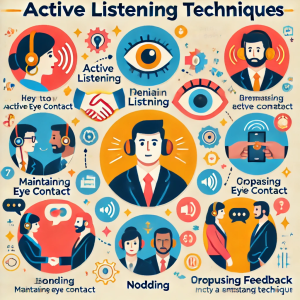By: Dr. Amanda Stone, Psychotherapist and BDSM Educator
Active listening is an essential skill that plays a pivotal role in fostering healthy, fulfilling relationships. In the hustle and bustle of daily life, it’s easy to fall into the trap of half-listening or merely waiting for your turn to speak. However, genuine active listening involves fully engaging with your partner, understanding their perspective, and responding thoughtfully. This comprehensive guide explores the power of active listening in relationships, offering practical tips and strategies to enhance communication, build trust, and deepen emotional intimacy.

Contents
- 1 Understanding Active Listening
- 2 Save The Benefits of Active Listening in Relationships
- 3 Save Practical Tips for Practicing Active Listening
- 4 Save Active Listening Exercises for Couples
- 5 Save Overcoming Common Barriers to Active Listening
- 6 Save The Role of Active Listening in Conflict Resolution
- 7 Save Conclusion
Understanding Active Listening
Active listening is more than just hearing the words your partner is saying; it involves paying full attention to the message being conveyed, both verbally and non-verbally. It requires an open mind, empathy, and a genuine interest in understanding your partner’s thoughts and feelings. Here are the key components of active listening:
- Full Attention: Focus entirely on your partner, eliminating distractions. This means putting away your phone, turning off the TV, and creating a conducive environment for meaningful conversation.
- Non-Verbal Cues: Use body language to show that you are listening. This includes maintaining eye contact, nodding, and using facial expressions that reflect empathy and understanding.
- Reflection: Reflect on what your partner has said by paraphrasing or summarizing their message. This shows that you are engaged and provides an opportunity for clarification.
- Empathy: Try to understand your partner’s emotions and perspectives. Empathizing with their feelings fosters a deeper emotional connection.
- Feedback: Provide thoughtful and constructive feedback, responding to the content of the conversation rather than just waiting for your turn to speak.

The Benefits of Active Listening in Relationships

Active listening offers numerous benefits that can transform your relationship. Here are some key advantages:
- Enhanced Communication: Active listening improves overall communication by ensuring that both partners feel heard and understood. This reduces misunderstandings and fosters clearer, more effective exchanges.
- Stronger Emotional Connection: When you actively listen, you create a safe space for your partner to express their feelings. This deepens emotional intimacy and strengthens your bond.
- Increased Trust: By consistently practicing active listening, you demonstrate respect and commitment to your partner, building a foundation of trust and reliability.
- Conflict Resolution: Effective listening is crucial for resolving conflicts. It allows you to address underlying issues, validate each other’s feelings, and find mutually satisfactory solutions.
- Personal Growth: Active listening encourages personal growth by challenging you to be more empathetic, patient, and self-aware.

Practical Tips for Practicing Active Listening

Incorporating active listening into your relationship requires conscious effort and practice. Here are some practical tips to help you develop this skill:
- Be Present: Focus on the present moment and give your partner your undivided attention. Avoid thinking about what you will say next or getting distracted by external factors.
- Show Interest: Demonstrate genuine interest in what your partner is saying. Ask open-ended questions that encourage them to share more about their thoughts and feelings.
- Avoid Interrupting: Resist the urge to interrupt, even if you disagree or have something important to add. Allow your partner to finish speaking before you respond.
- Use Reflective Statements: Reflect back what your partner has said to show that you understand. For example, “It sounds like you’re feeling frustrated because…”
- Validate Feelings: Acknowledge and validate your partner’s emotions, even if you don’t fully agree with their perspective. This shows empathy and respect.
- Be Patient: Active listening requires patience. Give your partner the time they need to express themselves without rushing or pressuring them.
- Practice Non-Verbal Communication: Use non-verbal cues like eye contact, nodding, and facial expressions to convey your attentiveness and empathy.

Active Listening Exercises for Couples

Practicing active listening can be enhanced through specific exercises designed to build communication skills and deepen your connection. Here are some exercises to try with your partner:
- The Speaker-Listener Technique: Take turns being the speaker and the listener. The speaker shares their thoughts and feelings on a specific topic while the listener focuses solely on understanding and reflecting back what they hear. Switch roles after a set time.
- Reflective Listening Practice: Sit facing each other and share something important. The listener reflects back what they hear, and the speaker confirms or clarifies the message. This helps ensure accurate understanding.
- Daily Check-Ins: Set aside a few minutes each day for a check-in where you actively listen to each other’s experiences and emotions. This keeps the lines of communication open and strengthens your bond.
- Mindful Listening: Practice mindful listening by being fully present and attentive during conversations. Focus on the sensations, emotions, and thoughts that arise while listening, without judgment.
- Role Reversal: Swap roles in a hypothetical or past conflict. Each partner explains the situation from the other’s perspective, fostering empathy and understanding.

Overcoming Common Barriers to Active Listening

Active listening can be challenging, especially when emotions run high or distractions are prevalent. Here are some common barriers and strategies to overcome them:
- Distractions: Eliminate external distractions by creating a conducive environment for conversation. Turn off electronic devices and find a quiet space.
- Emotional Reactivity: Manage your emotions by practicing self-awareness and emotional regulation. Take deep breaths and remain calm, even if the conversation is difficult.
- Preconceptions: Let go of preconceptions and judgments. Approach each conversation with an open mind and a willingness to understand your partner’s perspective.
- Impatience: Cultivate patience by reminding yourself of the importance of active listening. Give your partner the time they need to express themselves fully.
- Defensiveness: Avoid becoming defensive during conversations. Focus on understanding rather than defending your position.

The Role of Active Listening in Conflict Resolution

Conflicts are inevitable in any relationship, but how you handle them can make a significant difference. Active listening plays a crucial role in resolving conflicts constructively:
- De-Escalating Tension: Active listening helps de-escalate tension by showing empathy and understanding. This creates a more conducive environment for resolving the issue.
- Identifying Underlying Issues: By listening attentively, you can identify the underlying issues and emotions driving the conflict. This allows for a more targeted and effective resolution.
- Finding Common Ground: Active listening encourages both partners to express their needs and perspectives, facilitating the discovery of common ground and mutually acceptable solutions.
- Rebuilding Trust: Resolving conflicts through active listening demonstrates respect and commitment, rebuilding trust and strengthening the relationship.

Conclusion

Active listening is a powerful tool that can transform your relationship by enhancing communication, deepening emotional intimacy, and building trust. By practicing active listening, you create a safe space for open and honest dialogue, fostering a stronger and more fulfilling connection with your partner. Remember that active listening requires conscious effort and patience, but the rewards are well worth it. Embrace the power of active listening and watch your relationship thrive.
Dr. Amanda Stone is a renowned psychotherapist and BDSM educator with over 15 years of experience in the field of human sexuality. She holds a Ph.D. in Clinical Psychology and has dedicated her career to exploring the intersections of mental health, sexuality, and spirituality. Dr. Stone is a passionate advocate for the healing potential of BDSM and regularly conducts workshops and seminars to educate individuals and couples on safe, consensual, and spiritually enriching BDSM practices.


